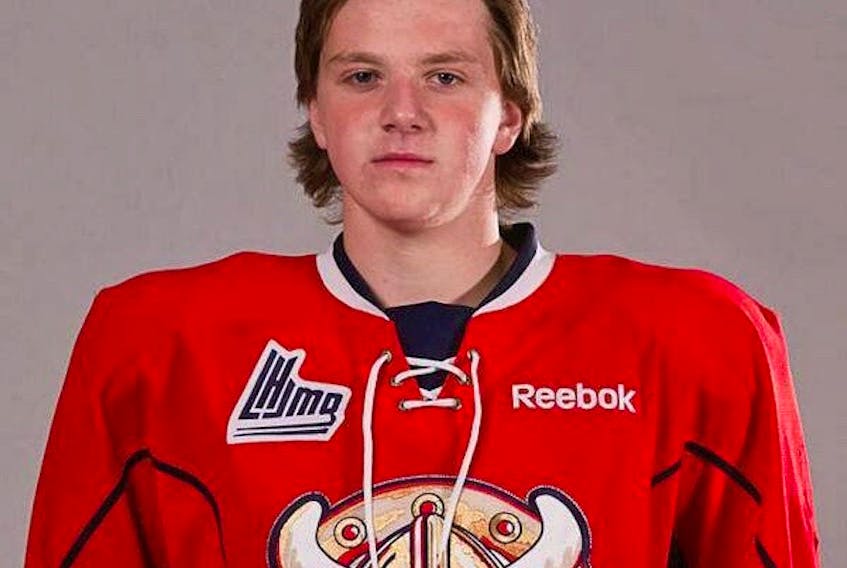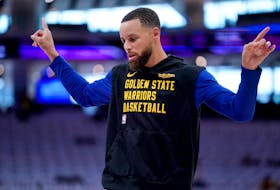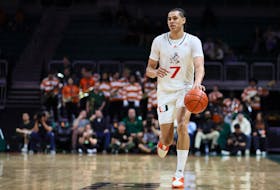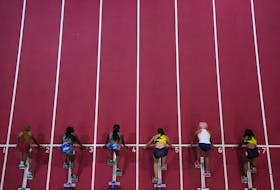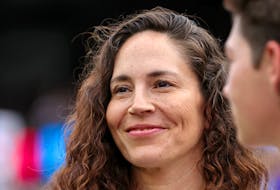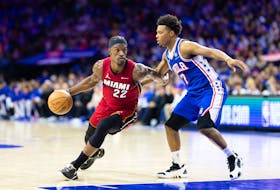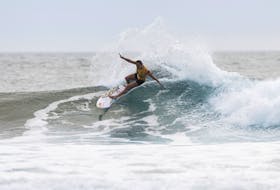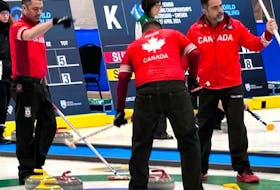Jordan Boyd might have been looking forward this week to his Christmas break from playing hockey.
Instead, a news conference was held Tuesday in Halifax on the subject of his death.
Boyd, of Bedford, was 16 when he collapsed onthe ice at the Acadie Bathurst Titan training
camp in August 2013 and died of cardiac arrest.
For his parents, life hasn’t improved much since that day.
“Not a lot, to be quite honest with you; it’s a very difficult thing to lose a child,” said Stephen Boyd, Jordan’s father. “Any parent that’s lost a child can understand the pain that goes with that. Jordan was just a great young man and we struggle every day.
“We still have his room at home that has all his trophies, and all his paraphernalia from playing hockey from the time he was three years old. We’ve got scrapbooks galore — some that his friends made — and we keep pictures of Jordan around the
house, we talk about Jordan every day, and we keep in touch with Jordan’s friends on a regular basis. He’s not with us anymore but he’s with us, if you know what I mean.”
On Tuesday, Quebec Major Junior Hockey League commissioner Gilles Courteau announced “significant” changes to the league’s safety protocol in the wake of Boyd’s death.
Each team must have at least three staff members trained in CPR and life-saving techniques, including the use of an automatic external defibrillator. Two of these trained staff members are to be present at all team events, including games, practices and tryouts.
Each team is to own a defibrillator, not just have access to one, and it’s to be in the possession of a trainer or athletic therapist at all team events.
Teams have to report every year the names of the people trained and provide confirmation to the league of their certification and annual refresher training. And the league’s physical exam at the pre-camp stage has been improved, to include a more thorough health questionnaire and physical examination of the player.
The changes took effect at the beginning of this season.
“The league has learned from this tragedy and is committed to learning from how this matter was handled,” Courteau said. “At the time of the event, the league communicated information which, afterwards, turned out to be lacking in accuracy. The league would like to officially and sincerely apologize to Jordan’s family and friends for the hurt this caused.”
Reporters asked Courteau
to clarify that statement, but he refused.
“At this point, I don’t want to be specific on what exactly was right or not right following some of the announcements that we’ve made, but I just want to say today that after reviewing the process that has been in place, the Boyd family deserves apologies from me as the league commissioner,” he said.
The league will also make a contribution of $50,000 to the Jordan Boyd Foundation, which strives to raise awareness about inherited heart disease in young people, especially athletes.
Stephen Boyd said his family is trying to create some positive change by taking part in consultations, and does not interpret the donation as an attempt to stave off a lawsuit.
“We didn’t want to go there,” he said. “We’ve had a very constructive dialogue with the league, in particular over the past couple of years, and we’re very satisfied with the changes they’ve announced. For us, that’s the absolute most important thing, that changes to the safety protocol have been put in place that we know are going to benefit players.
“We understand that there’s no foolproof system that can be put in place to ensure tragedies like the one that happened to Jordan (don’t) happen again. We do think something can be learned to improve the chances of a different outcome in the future.”
Asked why it took four years for the QMJHL to make the changes, Courteau said the league wanted input from the Boyds and didn’t want to pester them in their time of mourning.
“It was not an easy situation for the Boyd family, to make recommendations and all that,” the commissioner said. “We had to respect that they needed time. Through their lawyer,
we’ve been in touch on a regular basis, trading documents and all that to make sure it was satisfactory to the Boyd family.”
For now, pre-draft screening by the QMJHL will not include a consultation with a cardiologist, but Courteau said it’s something that could happen in the future.
Stephen Boyd thinks players should have an electrocardiogram procedure. “I do feel that, for instance, an EKG, which is a fairly simple test, quite inexpensive as I understand it and takes maybe 20 seconds. I think that would be a good start in going an additional step in identifying potential cardiac issues,” he said.
His family had no idea Jordan was at any cardiac risk; there was no family history and he was in top physical condition. So his father is pleased by the increase in QMJHL team staff who will be trained in the use of a defibrillator.
“It’s been well documented that in the event of a cardiac arrest, immediate application of proper CPR and a shock from an AED is critical,” he said. “Research shows that if a cardiac arrest victim receives defibrillation through an AED within the first minute, their survival rate is 90 per cent. . . . Thirty to 50 per cent of cardiac arrest victims would survive if AEDs were used within five minutes.”
-Bill Spurr

